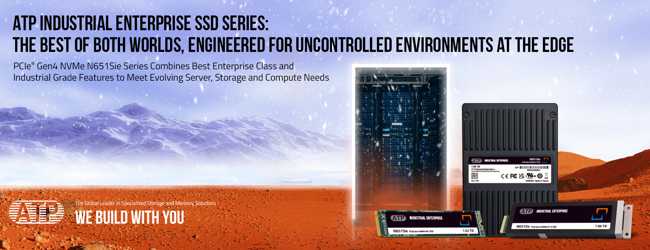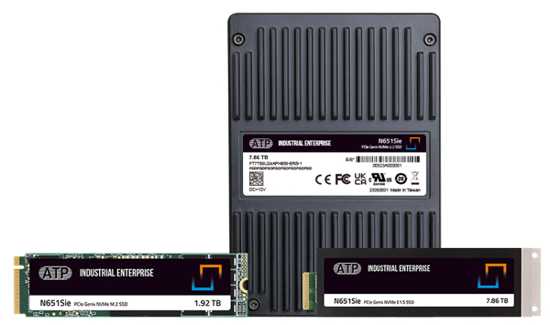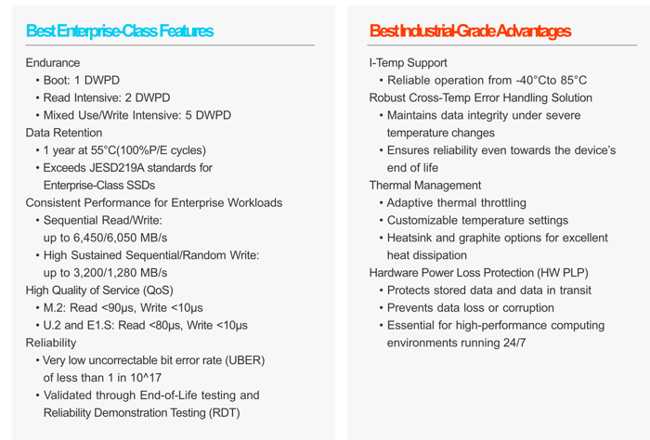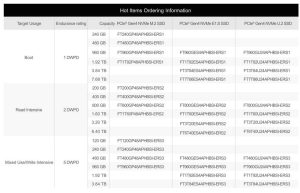ATP Industrial Enterprise N651Sie Series PCIe Gen4 M.2, U.2, and E1.S. Form Factors SSDs, Best of Both Worlds
Combines enterprise class and industrial grade features to meet evolving server, storage and compute needs.
This is a Press Release edited by StorageNewsletter.com on September 3, 2024 at 2:01 pmEnterprise storage/computing is becoming less centralized in datacenters and controlled environments and becoming more distributed. Data is being driven to the edge where operating conditions are more extreme, locations are not easy to reach, and often, on the constant move. A new breed of storage solutions is needed, which combines the benefits of industrial SSDs and enterprise solutions.
ATP Electronics, Inc. unleashes a product class, going beyond the limits of traditional storage solutions, and offering the best of both of industrial and enterprise worlds: The Industrial Enterprise Series.
The firm’s industrial enterprise N651Sie Series SSDs leverage NVMe PCIe Gen4x 4 and are available as M.2, U.2, and E1.S. They are built for the age of data deluge as centralized computing increasingly moves to the edge, and enterprise operations in uncontrolled environments become more prevalent.
They combine the best of enterprise and industrial features, making them excellent as boot drives, data storage drives, or mixed-use drives.
Best of both worlds: Engineered for enterprise-class workloads in uncontrolled environments:
-
-
Endurance. The N651Sie Series offers varied endurance ratings suitable for specific uses.
-
-
-
Target usage
Endurance (DWPD)*
Boot
1
Read intensive
2
Mixed use/write intensive
5
-
* Drive Writes per Day
-
- Data retention. With 100% P/E cycles, Industrial Enterprise SSDs can store data for up to a year at 55°C. This exceeds JESD219A standards for Enterprise-Class SSDs typically operating at 55°C for 24 hours a day, which should be able to retain data for 3 months at 40°C after it is powered off.
- Consistent performance for enterprise workloads. Sequential RW performance of up to 6,450/6,050MB/s along with high sustained sequential/random write of up to 3,200/1,280MB/s translate to consistency and not just high burst performance.
- High QoS. A QoS 99.9999% with read <90µs and write <10µs for M.2; read <80µs and write <10µs for U.2 and E1.S.
- Reliability. Very low uncorrectable bit error rate (UBER) value of less than 1 in 10^17 validated through End-of-Life testing and Reliability Demonstration Testing (RDT).
Industrial-grade advantages:
-
- I-Temp support, robust cross-temp error handling. Industrial Enterprise SSDs operate reliability within a 125°C temperature range for reliable operation from -40°C to 85°C). ATP Electronics’ Cross-Temp Error Handling solution maintains the reliability and data integrity of NAND flash under severe temperature changes and even towards the storage device’s end of life.
- Hardware Power Loss Protection (HW PLP) protects stored data as well as data in transit to prevent data loss or corruption, especially in high-performance computing environments where devices are running 24/7.
ATP’s Enterprise Readiness Standards: Over 70% of companies listed on Gartner’s Magic Quadrant report for Primary Storage, Data Center and Cloud Computing, and WAN-Edge Infrastructure consider ATP as a strategic supplier.
The company excels in supporting enterprise infrastructures with its extensive testing and validation capabilities. This includes utilizing prime NAND packages, conducting rigorous NAND IC characterization, and performing 100% NAND screening and validation. Additionally, the firm enhances its offerings with custom-developed firmware, specialized hardware configurations, and advanced technologies. Consequently, over 70% of companies featured in Gartner’s Magic Quadrant for Primary Storage, Data Center and Cloud Computing, and WAN-Edge Infrastructure regard ATP as a key strategic supplier.
Under ATP’s ‘WE BUILD WITH YOU’ program, the following enhanced ‘Firmware Customization Services’ are available on a project basis to meet various enterprise customer needs in server, storage and compute.
- Performance behavior tuning. Performance behavior analysis and customization to optimize throughput and latency in a customer host application.
- Power Loss Protection (PLP) tuning
- Optimized flush cache timing. Ensures that the flush cache is completed within the capacitors’ hold-up time to ensure the integrity of data in flight and at rest.
- PLP capacitor monitoring. Performed using the onboard microcontroller unit (MCU), includes regular capacitor health checks during SSD bootup and operation.
Thermal management customization
The company’s adaptive thermal throttling solution is distinguished by the ability to adjust the temperature settings according to the customer’s application-specific requirements.
- Enhanced read disturb resilience. The ATP FW monitors and refreshes frequently read and read-only data by moving it to another block when the error criteria or threshold is met. The company can modify the FW to enhance its ability to withstand Read Disturb events in specific enterprise use cases, such as ‘Boot-Up Scenarios’.
- SMART ID customization. The firmware includes a range of SMART ID attributes that can be customized based on customer requirements.
- Download microcode capability. This service is part of flexible firmware maintenance, enabling Enterprise customers to rapidly make updates to their specific configurations via field updates, avoiding the hassle of sending SSDs back to ATP for reinitialization.
| Product Line | N651Sie | ||
| Interface | Gen4 x4 | ||
| Form Factor | M.2 | U.2 | E1.S |
| Dimensions (mm) | 80 x 22 x 3.85 | 100 x 69.85 x 15 | 118.75 x 33.75 x 9.5 |
| Flash Type | TLC | ||
| Capacity | 120 GB to 1.92 TB | 480 GB to 7.68 TB | 480 GB to 7.68 TB |
| Sequential Read (up to) 1,6,7 | 6,450 MB/s | 6,000 MB/s | 6,100 MB/s |
| Sequential Write (up to) 1,6,7 | 6,050 MB/s | 5,500 MB/s | 6,000 MB/s |
| Random Read (up to) 2,6,7 | 1,100 KIOPS | 820 KIOPS | 870 KIOPS |
| Random Write (up to) 2,6,7 | 1,250 KIOPS | 1,200 KIOPS | 1,200 KIOPS |
| Sustained Sequential Write (up to) 3,6,7 |
3,000 MB/s | 3,200 MB/s | 3,200 MB/s |
| Sustained Random Write (up to) 4,6,7 | 250 KIOPS (1,000 MB/s) | 320 KIOPS (1,280 MB/s) | 320 KIOPS (1,280 MB/s) |
| Endurance [DWPD] 8 | Available in 1, 2, and 5 DWPD configurations | ||
| QoS 99.9999% 5,6,7 | Read <90µs | Write <10µs | Read <80µs | Write <10µs | Read <80µs | Write <10µs |
| Data Retention | 1 year at 55°C (100% P/E cycles) | ||
| Power Loss Protection | Yes | ||
| End to End Data Path Protection | Yes | ||
| Sustained Read Power (Max) 7 | <9W | <14.5W | <13W |
| Sustained Write Power (Max) 7 | <11.5W | <17.5W | <15.5W |
| Supply Voltage | 3.3V | 12V | 12V |
| Operating Temperature Tc | -40°C to 85°C (I-Temp) | ||
| Storage Temperature Tc | -40°C to 85°C | ||
| Vibration | Sine 16.4G,10~2,000Hz | ||
| Shock | Half sine 1,500G/0.5ms | ||
| MTBF @ 25°C | > 3,000,000 hours | ||
| UBER | <1 sector per 10^17 bits read | ||
| Warranty | 5 years | ||
Notes:
1. Sequential Burst Performance tested with IOmeter 4MB, QD64
2. Random Burst Performance tested with IOmeter 4KB, QD64
3. Average Sustained Sequential Write Performance tested with IOmeter, 4MB, QD64 for 4 hours
4. Average Sustained Random Write Performance tested with IOmeter, 4KB, QD64 for 4 hours
5. 4KB Random QD=1
6. Actual performance may vary depending on user conditions and system environment
7. Parameters tested with highest capacity drive
8. DWPD for 5 years tested with JESD219A Enterprise workload
Resource:
Explore engineering and development of Industrial Enterprise SSD Series in ATP Enterprise Readiness Standard, which encapsulates decade of experience with enterprise customers (registration required).

















 Subscribe to our free daily newsletter
Subscribe to our free daily newsletter

